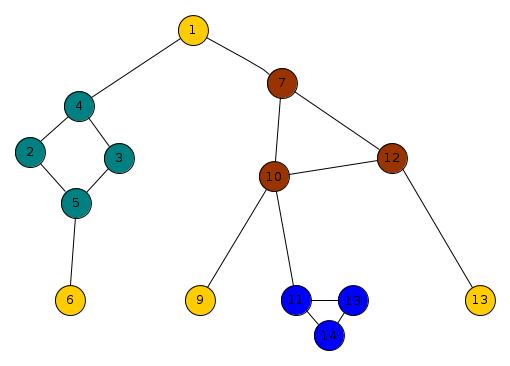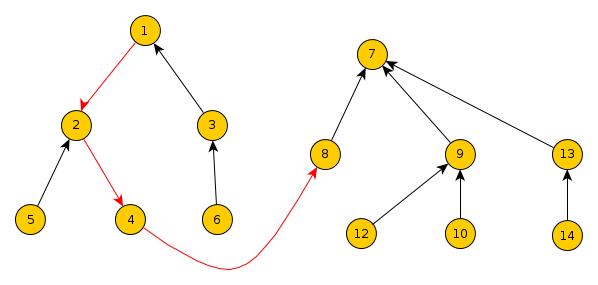Problem Link : Problem 1
Simple Problem: One of the basic applications of Principal of Inclusion-Exclusion (PIE) .
#include <bits/stdc++.h>
using namespace std;
/*------- Constants---- */
#define Long long long
#define ull unsigned long long
#define mod 1000000007
#define MEMSET_INF 63
#define MEM_VAL 1061109567
#define forn(i,n) for( int i=0 ; i < n ; i++ )
#define mp(i,j) make_pair(i,j)
#define lop(i,a,b) for( int i = (a) ; i < (b) ; i++)
#define pb(a) push_back((a))
#define all(x) (x).begin(),(x).end()
#define gc getchar_unlocked
#define PI acos(-1.0)
#define INF 1<<29
#define EPS 1e-9
#define Fr first
#define Sc second
#define Sz size()
#define lc ((n)<<1)
#define rc ((n)<<1|1)
#define db(x) cout << #x << " -> " << x << endl;
#define Di(n) int n;si(n)
#define Dii(a,b) int a,b;si(a);si(b)
#define Diii(a,b,c) int a,b,c;si(a);si(b);si(c)
#define Si(n) si(n)
#define Sii(a,b) si(a);si(b)
#define Siii(a,b,c) si(a);si(b);si(c)
#define min(a,b) ((a)>(b) ? (b) : (a) )
#define max(a,b) ((a)>(b) ? (a):(b))
/*---- short Cuts ------- */
#define ms(ara_name,value) memset(ara_name,value,sizeof(ara_name))
typedef pair<int, int> ii;
typedef vector<int > vi ;
typedef vector<Long> vl;
/*------ template functions ------ */
#ifndef getchar_unlocked
#define getchar_unlocked getchar
#endif
template<class T> inline void si(T &x){register int c = gc();x = 0;int neg = 0;for(;((c<48 | c>57) && c != '-');c = gc());
if(c=='-') {neg=1;c=gc();}for(;c>47 && c<58;c = gc()) {x = (x<<1) + (x<<3) + c - 48;}if(neg) x=-x;}
Long bigmod(Long p,Long e,Long M){Long ret = 1;for(; e > 0; e >>= 1){if(e & 1) ret = (ret * p) % M;p = (p * p) % M;} return ret;}
Long gcd(Long a,Long b){if(b==0)return a;return gcd(b,a%b);}
Long modinverse(Long a,Long M){return bigmod(a,M-2,M);}
void io(){freopen("/Users/MyMac/Desktop/in.txt","r",stdin);}
/*************************** END OF TEMPLATE ****************************/
const int N= 16;
int a[N];
int main()
{
Dii(n,k);
forn(i,k) Si(a[i]);
Long ans =0 ;
forn(i,1<<k){
Long p = 1, cnt = 0;
forn(j,k) {
if(i&1<<j) {
cnt ++;
Long g = gcd(p,a[j]);
p = p * a[j] /g;
}
}
if(cnt) {
if(cnt % 2) ans += n/p;
else ans -= n/p;
}
}
printf("%lld\n", n - ans);
return 0;
}
The time-complexity can slightly improved if we delete a number such that it has a divisor already in the list. With this We can shrink the size of the SET.
#include <bits/stdc++.h>
using namespace std;
/*------- Constants---- */
#define Long long long
#define ull unsigned long long
#define mod 1000000007
#define MEMSET_INF 63
#define MEM_VAL 1061109567
#define forn(i,n) for( int i=0 ; i < n ; i++ )
#define mp(i,j) make_pair(i,j)
#define lop(i,a,b) for( int i = (a) ; i < (b) ; i++)
#define pb(a) push_back((a))
#define all(x) (x).begin(),(x).end()
#define gc getchar_unlocked
#define PI acos(-1.0)
#define INF 1<<29
#define EPS 1e-9
#define Fr first
#define Sc second
#define Sz size()
#define lc ((n)<<1)
#define rc ((n)<<1|1)
#define db(x) cout << #x << " -> " << x << endl;
#define Di(n) int n;si(n)
#define Dii(a,b) int a,b;si(a);si(b)
#define Diii(a,b,c) int a,b,c;si(a);si(b);si(c)
#define Si(n) si(n)
#define Sii(a,b) si(a);si(b)
#define Siii(a,b,c) si(a);si(b);si(c)
#define min(a,b) ((a)>(b) ? (b) : (a) )
#define max(a,b) ((a)>(b) ? (a):(b))
/*---- short Cuts ------- */
#define ms(ara_name,value) memset(ara_name,value,sizeof(ara_name))
typedef pair<int, int> ii;
typedef vector<int > vi ;
typedef vector<Long> vl;
/*------ template functions ------ */
#ifndef getchar_unlocked
#define getchar_unlocked getchar
#endif
template<class T> inline void si(T &x){register int c = gc();x = 0;int neg = 0;for(;((c<48 | c>57) && c != '-');c = gc());
if(c=='-') {neg=1;c=gc();}for(;c>47 && c<58;c = gc()) {x = (x<<1) + (x<<3) + c - 48;}if(neg) x=-x;}
Long bigmod(Long p,Long e,Long M){Long ret = 1;for(; e > 0; e >>= 1){if(e & 1) ret = (ret * p) % M;p = (p * p) % M;} return ret;}
Long gcd(Long a,Long b){if(b==0)return a;return gcd(b,a%b);}
Long modinverse(Long a,Long M){return bigmod(a,M-2,M);}
void io(){freopen("/Users/MyMac/Desktop/in.txt","r",stdin);}
/*************************** END OF TEMPLATE ****************************/
const int N = 1001;
bool vis[20];
int a[N];
int main()
{
Dii(n,k);
forn(i,k) Si(a[i]);
sort(a,a+k);
vector<int> I;
forn(i,k) I.pb(a[i]);
I.resize(unique(all(I)) - I.begin());
for(int i = 0; i< I.Sz; i++ ) {
for(int j = i+1 ; j < I.Sz; j ++) {
if(I[j] % I[i] == 0 ) vis[j] = 1;
}
}
vector<int> S;
for(int i = 0; i < I.Sz;i ++ ) {
if(vis[i] == 0 )S.pb(I[i]);
}
Long ans= 0;
forn(i,1<<S.Sz){
Long p = 1, cnt = 0;
double d = 1;
forn(j,S.Sz) {
if(i&1<<j) {
cnt ++;
Long g = gcd(p,S[j]);
p = p * S[j] /g;
d = d * S[j] /g;
}
}
if(cnt && d <= n + EPS) {
if(cnt % 2) ans += n/p;
else ans -= n/p;
}
}
printf("%lld\n", n - ans);
return 0;
}
Problem 2 : HDU – 2204
Solution:
Maximum value of K = 60 , as 2^60> 1e18;
The number of primes <= 60 , 17
So, We need to calculate as follows, How many numbers is in form p^2, p^3,….
Now when calculating # of perfect square, and # of perfect cube , we overcount , some numbers are counted twice. What are they, Number in form p^6, as this number is in form (p^3)^2, and in form (p^2)^3, Thus the PIE apples.
So we need to subtract overcount .
#include <bits/stdc++.h>
using namespace std;
/*------- Constants---- */
#define Long long long
#define ull unsigned long long
#define mod 1000000007
#define MEMSET_INF 63
#define MEM_VAL 1061109567
#define forn(i,n) for( int i=0 ; i < n ; i++ )
#define mp(i,j) make_pair(i,j)
#define lop(i,a,b) for( int i = (a) ; i < (b) ; i++)
#define pb(a) push_back((a))
#define all(x) (x).begin(),(x).end()
#define gc getchar_unlocked
#define PI acos(-1.0)
#define INF 1<<29
#define EPS 1e-9
#define Fr first
#define Sc second
#define Sz size()
#define lc ((n)<<1)
#define rc ((n)<<1|1)
#define db(x) cout << #x << " -> " << x << endl;
#define Di(n) int n;si(n)
#define Dii(a,b) int a,b;si(a);si(b)
#define Diii(a,b,c) int a,b,c;si(a);si(b);si(c)
#define Si(n) si(n)
#define Sii(a,b) si(a);si(b)
#define Siii(a,b,c) si(a);si(b);si(c)
#define min(a,b) ((a)>(b) ? (b) : (a) )
#define max(a,b) ((a)>(b) ? (a):(b))
/*---- short Cuts ------- */
#define ms(ara_name,value) memset(ara_name,value,sizeof(ara_name))
typedef pair<int, int> ii;
typedef vector<int > vi ;
typedef vector<Long> vl;
/*------ template functions ------ */
#ifndef getchar_unlocked
#define getchar_unlocked getchar
#endif
template<class T> inline void si(T &x){register int c = gc();x = 0;int neg = 0;for(;((c<48 | c>57) && c != '-');c = gc());
if(c=='-') {neg=1;c=gc();}for(;c>47 && c<58;c = gc()) {x = (x<<1) + (x<<3) + c - 48;}if(neg) x=-x;}
Long bigmod(Long p,Long e,Long M){Long ret = 1;for(; e > 0; e >>= 1){if(e & 1) ret = (ret * p) % M;p = (p * p) % M;} return ret;}
Long gcd(Long a,Long b){if(b==0)return a;return gcd(b,a%b);}
Long modinverse(Long a,Long M){return bigmod(a,M-2,M);}
void io(){freopen("/Users/MyMac/Desktop/in.txt","r",stdin);}
/*************************** END OF TEMPLATE ****************************/
const int N = 60;
vector<int> Prime;
bool vis[N];
void seive()
{
for(int i= 2;i < 60 ; i ++ ) {
if(vis[i]==0) {
Prime.pb(i);
for(int j = 2 * i ; j < 60; j += i ) vis[j] = 1;
}
}
}
Long ans;
Long n;
void dfs(int M, int ind , int p)
{
if(M >60 || (1LL << M ) > n) return;
if(ind == Prime.Sz) {
if(M!=1) {
ans += ((int) (pow(n, 1./M) ) - 1) * p;
}
return;
}
dfs(M * Prime[ind] , ind+1,-p);
dfs(M , ind+1, p);
}
int main()
{
seive();
while(scanf("%lld",&n)==1) {
ans=1;
dfs(1,0,-1);
printf("%lld\n", ans);
}
return 0;
}
Again This code can be re-written by using bit mask technique
#include <bits/stdc++.h>
using namespace std;
/*------- Constants---- */
#define Long long long
#define ull unsigned long long
#define mod 1000000007
#define MEMSET_INF 63
#define MEM_VAL 1061109567
#define forn(i,n) for( int i=0 ; i < n ; i++ )
#define mp(i,j) make_pair(i,j)
#define lop(i,a,b) for( int i = (a) ; i < (b) ; i++)
#define pb(a) push_back((a))
#define all(x) (x).begin(),(x).end()
#define gc getchar_unlocked
#define PI acos(-1.0)
#define INF 1<<29
#define EPS 1e-9
#define Fr first
#define Sc second
#define Sz size()
#define lc ((n)<<1)
#define rc ((n)<<1|1)
#define db(x) cout << #x << " -> " << x << endl;
#define Di(n) int n;si(n)
#define Dii(a,b) int a,b;si(a);si(b)
#define Diii(a,b,c) int a,b,c;si(a);si(b);si(c)
#define Si(n) si(n)
#define Sii(a,b) si(a);si(b)
#define Siii(a,b,c) si(a);si(b);si(c)
#define min(a,b) ((a)>(b) ? (b) : (a) )
#define max(a,b) ((a)>(b) ? (a):(b))
/*---- short Cuts ------- */
#define ms(ara_name,value) memset(ara_name,value,sizeof(ara_name))
typedef pair<int, int> ii;
typedef vector<int > vi ;
typedef vector<Long> vl;
/*------ template functions ------ */
#ifndef getchar_unlocked
#define getchar_unlocked getchar
#endif
template<class T> inline void si(T &x){register int c = gc();x = 0;int neg = 0;for(;((c<48 | c>57) && c != '-');c = gc());
if(c=='-') {neg=1;c=gc();}for(;c>47 && c<58;c = gc()) {x = (x<<1) + (x<<3) + c - 48;}if(neg) x=-x;}
Long bigmod(Long p,Long e,Long M){Long ret = 1;for(; e > 0; e >>= 1){if(e & 1) ret = (ret * p) % M;p = (p * p) % M;} return ret;}
Long gcd(Long a,Long b){if(b==0)return a;return gcd(b,a%b);}
Long modinverse(Long a,Long M){return bigmod(a,M-2,M);}
void io(){freopen("/Users/MyMac/Desktop/in.txt","r",stdin);}
/*************************** END OF TEMPLATE ****************************/
const int N = 60;
vector<int> Prime;
bool vis[N];
void seive()
{
for(int i= 2;i < 60 ; i ++ ) {
if(vis[i]==0) {
Prime.pb(i);
for(int j = 2 * i ; j < 60; j += i ) vis[j] = 1;
}
}
}
Long ans;
Long n;
int main()
{
seive();
while(scanf("%lld",&n)==1) {
ans=1;
for(int i = 1;i < 1<< Prime.Sz; i ++) {
int k = 1 , cnt = 0;
bool flag = 1;
for(int j = 0; j < Prime.Sz; j ++ ) {
if( i & 1<< j )
{
k *= Prime[j];
if( k > 60 ) {
flag= 0;
}
cnt ++;
}
}
if(flag) {
ans += ((int) (pow(n,1./k) + EPS )-1) * ((cnt&1) ? 1 : -1);
//db(ans);
}
}
printf("%lld\n", ans);
}
return 0;
}




